
* * * * * * * * * * * * * * * * * * * * * * * * * * * * * * * * * * * * * * * * * * * * * * * * * * * * * * * * * * * * *
VESPERS AT SISTINE CHAPEL
AND BARTHOLOMEW I'S SYNOD INTERVENTION
October 18, 2008
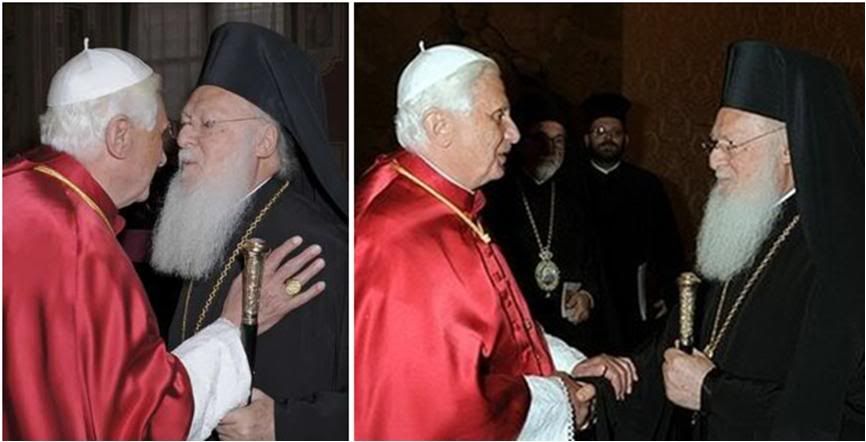
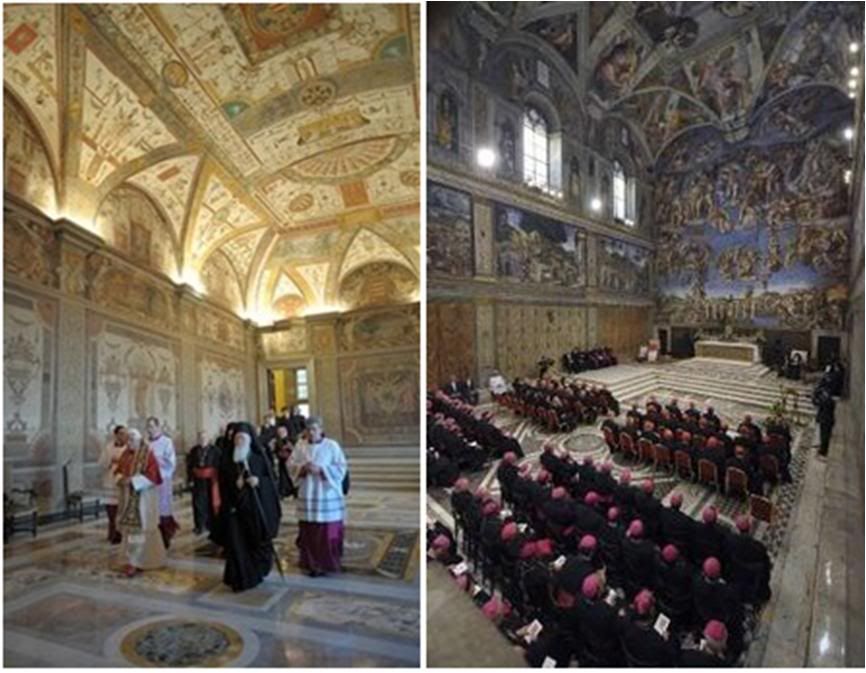
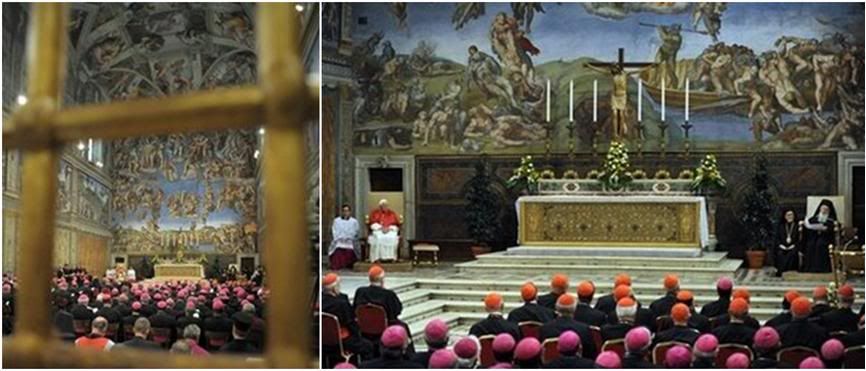 ZENIT so far has had the only news report that gives the theological sense of Patriarch Bartholomew's historic intervention, rather than focusing on the couple of statements he made that have 'social' relevance. They took full advantage of having the complete text of the Patriarch's intervention,
www.zenit.org/article-23981?l=english
which really deserves to be read in full. I have also posted it in
ZENIT so far has had the only news report that gives the theological sense of Patriarch Bartholomew's historic intervention, rather than focusing on the couple of statements he made that have 'social' relevance. They took full advantage of having the complete text of the Patriarch's intervention,
www.zenit.org/article-23981?l=english
which really deserves to be read in full. I have also posted it in NEWS ABOUT THE CHURCH:
Patriarch urges 'touching' - the Word of God
Bartholomew I on the use of "spiritual senses'
VATICAN CITY, OCT. 19, 2008 (Zenit.org).- Most Christians have heard the Word of God, but have they seen it in art or nature, or realized they were touching it in the Eucharist?
Orthodox Patriarch Bartholomew I of Constantinople spoke Saturday afternoon at the celebration of vespers in the Sistine Chapel of using one's "spiritual senses" to perceive the Word of God.
The event, presided over by Benedict XVI and attended by some 400 cardinals, bishops, religious and laypeople, took place within the context of the world Synod of Bishops on the Word of God, which is under way in the Vatican through Oct. 26.
The first Patriarch in history to be invited to address a world Synod of Bishops, Bartholomew I noted that his presence was "an important step toward the restoration of our full communion."
"We regard this as a manifestation of the work of the Holy Spirit leading our Churches to a closer and deeper relationship with each other," he said.
Sitting with Michelangelo's "Final Judgment" behind him, the p\Patriarch discussed the importance of the synod's theme.
"The Church needs [...] to rediscover the Word of God in every generation," he said, "and make it head with a renewed vigor and persuasion also in our contemporary world, which deep in its heart thirsts for God’s message of peace, hope and charity."
He continued: "This duty of evangelization would have been, of course, greatly enhanced and strengthened if all Christians were in a position to perform it with one voice and as a fully united Church.
"It is, therefore, most appropriate, that this synod has opened its doors to ecumenical fraternal delegates so that we may all become aware of our common duty of evangelization as well as of the difficulties and problems of its realization in today’s world."
The patriarch, drawing on the Patristic doctrine of the "spiritual senses," then spoke of three "spiritual ways of perceiving" the Word of God: "listening to God’s Word, beholding God’s Word, and touching God’s Word."
He reflected first of all "on hearing and speaking the Word of God through the holy Scriptures."
"The Christian Church is, above all, a scriptural Church," Bartholomew I said. "Although methods of interpretation may have varied [...] Scripture was always received as a living reality and not a dead book."
"In the context of a living faith," he added, "Scripture is the living testimony of a lived history about the relationship of a living God with a living people."
The Patriarch said that in this sense that Christians must "provide a unique perspective -- beyond the social, political, or economic -- on the need to eradicate poverty, to provide balance in a global world, to combat fundamentalism or racism, and to develop religious tolerance in a world of conflict."
Bartholomew I affirmed that the Word of God can be seen "in nature and above all in the beauty of the icons": "Nowhere is the invisible rendered more visible than in the beauty of iconography and the wonder of creation."
"Icons are a visible reminder of our heavenly vocation," he explained. "They are invitations to rise beyond our trivial concerns and menial reductions of the world. They encourage us to seek the extraordinary in the very ordinary.
"Icons underline the Church’s fundamental mission to recognize that all people and all things are created and called to be 'good' and 'beautiful'."
Regarding nature, the Patriarch affirmed: "All genuine 'deep ecology' is inextricably linked with deep theology."
“Even a stone,” Bartholomew I stated, quoting Basil the Great, “bears the mark of God’s Word. This is true of an ant, a bee and a mosquito, the smallest of creatures. For he spread the wide heavens and laid the immense seas; and He created the tiny hollow shaft of the bee’s sting.”
The Patriarch added, "Recalling our minuteness in God’s wide and wonderful creation only underlines our central role in God’s plan for the salvation of the whole world."
Bartholomew I said that the Word of God, which "receives his full embodiment" in the sacrament of the Eucharist, can be touched and shared "in the communion of saints and the sacramental life of the Church."
In the Eucharist, he explained, "the Word becomes flesh and allows us not simply to hear or see him, but to touch him with our own hands."
"Word and sacrament become one reality," the patriarch added. "The word ceases to be 'words' and becomes a Person, embodying in himself all human beings and all creation."
Bartholomew I said the example of saints is "the tangible experience and human expression of God’s Word in our community."
"In the gentle presence of a saint," he explained, "we learn how theology and action coincide. In the compassionate love of the saint, we experience God as 'our father' and God’s mercy as 'steadfastly enduring'."
"Each of us is called to 'become like fire,' to touch the world with the mystical force of God’s Word," he said, "so that - as the extended Body of Christ - the world, too, might say: 'Someone touched me!'"
"Evil," continued Bartholomew I, "is only eradicated by holiness, not by harshness. And holiness introduces into society a seed that heals and transforms."
"It is like the tectonic plates of the earth’s crust," he explained. "The deepest layers need only shift a few millimeters to shatter the world’s surface.
"Yet for this spiritual revolution to occur, we must experience radical 'metanoia' - a conversion of attitudes, habits and practices - for ways that we have misused or abused God’s Word, God’s gifts and God’s creation."
The Patriarch added: "The challenge before us is the discernment of God’s Word in the face of evil, the transfiguration of every last detail and speck of this world in the light of Resurrection.
"The victory is already present in the depths of the Church, whenever we experience the grace of reconciliation and communion."
Bartholomew I:
A historic intervention
at the Bishops' Synod
by ALBERTO BOBBIO
Translated from

October 19, 2008
VATICAN CITY - Under Michelangelo's great fresco of The Last Judgment, the Patriarch of Constantinople, first among equals of all the patriarchs of the Orthodox Church, addressed a Roman Catholic Bishops' Synod for the first time.
Nothing similar has happened since the Great Schism of 1054. The distinction goes to Bartholomew I, whose address comes during the year dedicated to St. Paul, Apostles of the undivided Church.
His intervention, delivered in the Sistine Chapel after Vespers jointly presided by Pope Benedict XVI and the Patriarch, is a sign of the great attention that Benedict XVI has for his special guest.
Bartholomew himself called his intervention 'a historic event' and expressed the hope that Catholics and Orthodox may arrive at 'full communion', overcoming current differences "to converge fully on the role of primacy and synodality in the life of the Church".
The Patriarch measured his words carefully, in view of the open divisions in the Orthodox world. Not everyone - particularly not Alexei II, Patriarch of Moscow, is happy about Bartholomew's growing association with the Church of Rome and the Holy See.
At a pan-Orthodox summit meeting held last week at the Phanar, Bartholomew's headquarters in Istanbul, the tensions were evident, despite a united front presented to the media.
In fact, there is no certainty yet that a pan-Orthodox Bishops Synod can be held next year - an event that has been spoke about for three decades and which Bartholomew considers a priority, but which the Patriarchate of Moscow has resisted, in its desire to play the lead role in the Orthodox world.
Bartholomew I has now carried out two important gestures to assert the leadership of Constantinople in the Orthodox world. First, he travelled to the Ukraine recently to lead the anniversary of the introduction of Christianity to the Slavic world in the 15th century. Ukrainian Orthodox are divided, with one faction loyal to Moscow, which has lost ground since the Ukraine became an independent country after the break-up of the Soviet Union.
And now, his attendance at the Synod. [At Benedict's invitation, obviously.]
The Patriarch delivered his intervention in English after the Vespers service. He was seated to the left of the altar, the Pope to the right.
He presented a long analysis in which he proposed the Word and the Eucharist as the pillars of Christian involvement in history.
[It was not an analysis of anything, but a synthesis of the Orthodox approach to Scriptures, which plays a major role in Orthodox life. So Bartholomew's presentation was pf particular interest to Catholics, for whom Scriptures became relegated to the background in the life of the faithful following the Protestant Reformation.]
At the end, the Pope thanked the Patriarch, saying that listening to the Word of God means facing the challenges of our time with 'Christian realism'.
"We should go the heart of Sacred Scriptures, put the Word of God into words that can open the eyes of the world to the realities of today", he said.
The Pope also pointed out that the Orthodox Fathers that Bartholomew cited in his presentation "are also our Fathers" and therefore, "that means we cannot be other than brothers".
Bartholomew focused his speech on three challenges that both Churches should face together: poverty, racism and fundamentalism.
He said that "as disciples of Christ, it was more than ever imperative to provide a single perspective on the need to eradicate poverty, promote equilibrium in the global society, combat fundamentalism and racism, and develop religious tolerance in a conflictual world."
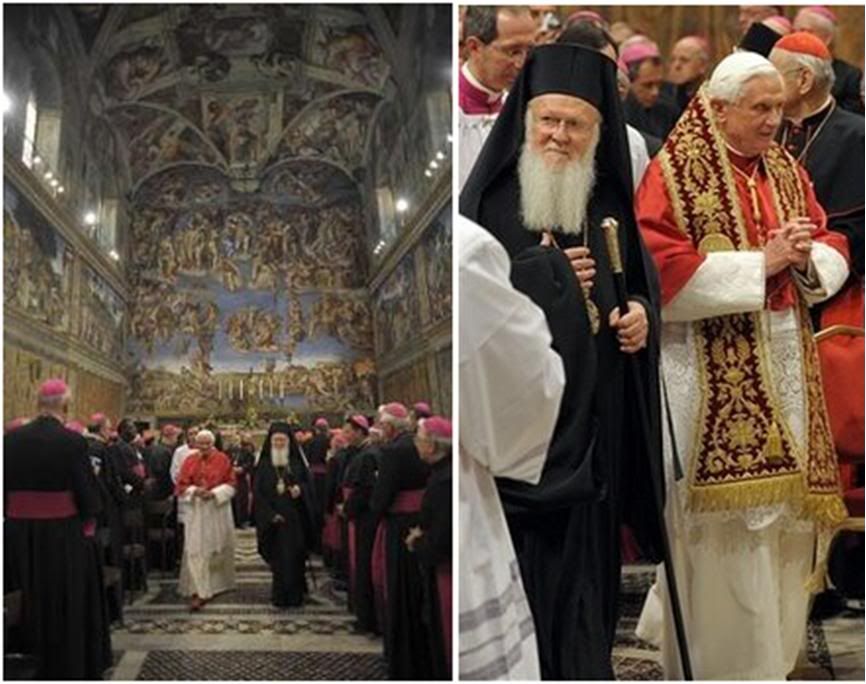
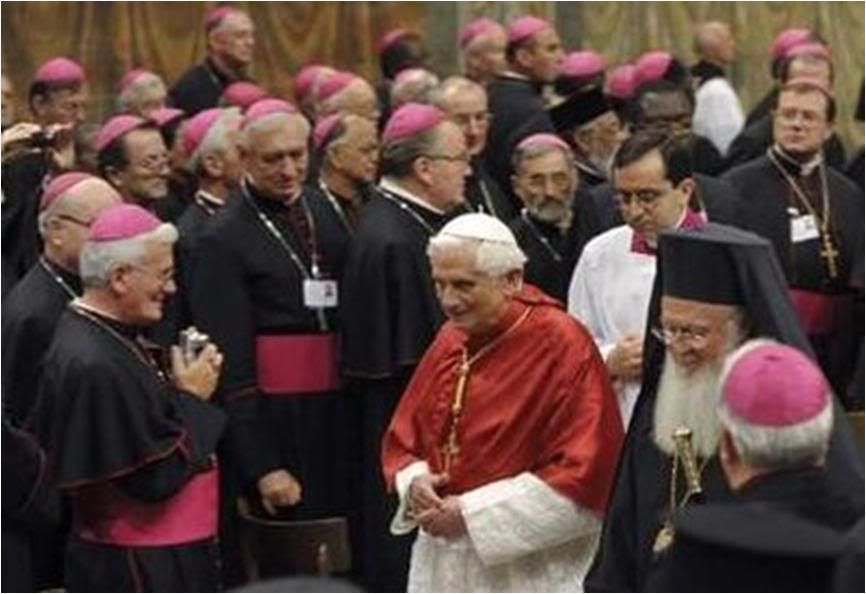 Pope and Orthodox Patriarch
Pope and Orthodox Patriarch
pray in Sistine Chapel
By DANIELA PETROFF

VATICAN CITY, Oct. 18 (AP) - The spiritual leader of the world’s Orthodox Christians prayed with Pope Benedict XVI in the Sistine Chapel on Saturday and urged Catholics and Orthodox to work together to combat fundamentalism and to promote religious tolerance.
Benedict praised his guest, Patriarch Bartholomew I, on the occasion of an Orthodox leader’s first service in the chapel, which is famous for its frescoes painted by Michelangelo.
Bartholomew’s participation in the Vespers service and speech, in the chapel where Popes are elected, is a “joyous experience of unity, perhaps not perfect, but true and deep,” Benedict said.
The two men are eager to bridge a nearly millennium-long schism between the two churches, and see moral and social issues — including fundamentalism, religious intolerance, abortion, euthanasia and environmental degradation — as fertile ground for common initiatives.
Bartholomew was invited to address bishops from around the world attending a meeting at the Vatican this month about the importance of the Bible.
Cardinals and bishops listened attentively as the Patriarch spoke about the potential for common initiatives between the world’s 250 million Orthodox and more than 1 billion Catholics.
The Orthodox leader called it more imperative than ever for both sides to provide a “unique perspective -- beyond the social, political or economic -- on the need to eradicate poverty, to provide balance in a global world, to combat fundamentalism or racism and to develop religious tolerance in a world of conflict.”
Bartholomew described the invitation to address the Pope and bishops in the Sistine Chapel as “at once humbling and inspiring.”
The split between Roman Catholic and Orthodox churches centers on the primacy of the Pope.
[The report should then have mentioned, at least, what Bartholomew said about 'synodality' and 'primacy' as essentials in Orthodox ecclesiology. Also, as usual, the report makes it appear that the Patriarch addressed the Synod primarily on social issues - when he mentioned those issues only as an example of the 'sacrament of neighbor' which must be joined to the 'sacrament of the altar', in a presentation about the Word of God in the life of the Orthodox Church.]
[Modificato da TERESA BENEDETTA 20/10/2008 13:23]